Weeknotes 30/06/2023
The team are still as busy as ever; we are upgrading the website, the charging scheme is going live shortly, and we’ve been very busy mixing and sharing ideas with other organisations across Wales over the past week.
Our corporate plan
The organisation has been running sessions about the new corporate plan over the last few weeks. A few of us in the team went to some of these sessions, and it was good to see people who we haven’t seen since the pandemic.
The plan is for the organisation to set out what work it needs to do and not do until 2030, and how we can all make a difference to protect nature and the environment.
Heledd, Sam and Phil from our team attended the Cardiff event. What struck Phil was that there is so much good work going on to help protect and improve the environment, species and nature.
The organisation is doing a great job. However, the processes that underpin this work are still not working as they should and that’s where the digital team can and are helping to make a massive difference.
Gov Camp Cymru 2023
This week the digital team and other members of our organisation attended an event called Gov Camp Cymru.
No, we never went camping in a tent, well Lucinda did when she visited Glastonbury, more on this later…..
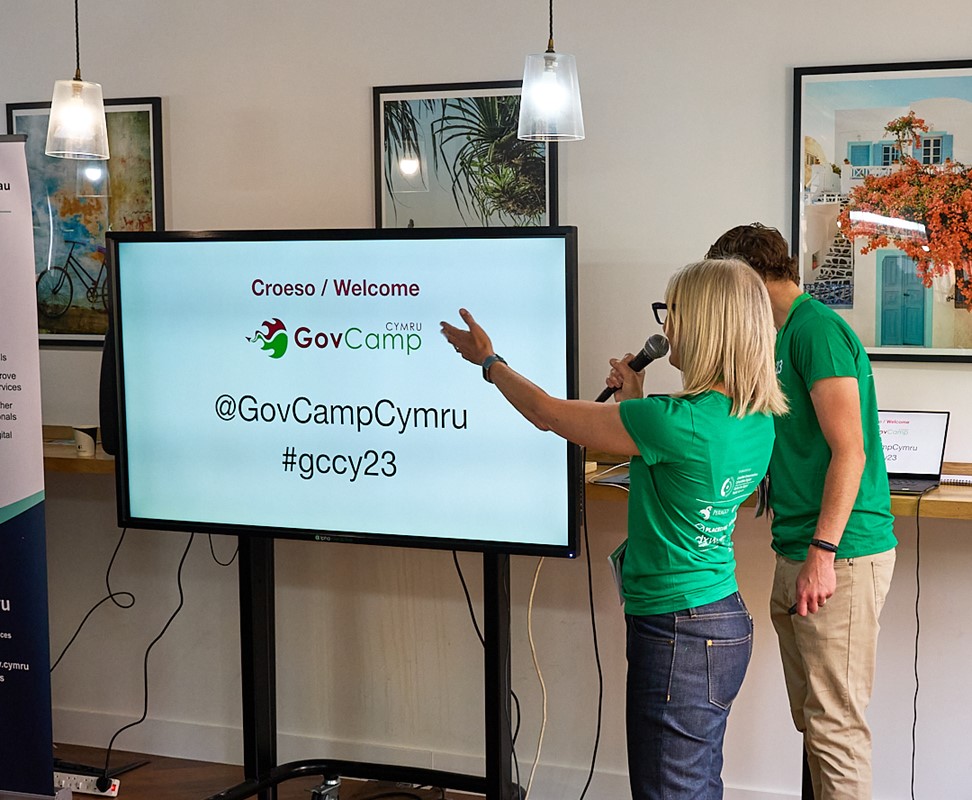
We live in a fast-changing Wales. This is especially true for those working in public services. Gov Camp Cymru explores how to tackle the big issues facing public services here in Wales.
Gov Camp Cymru is an unconference.
An unconference is a conference without an agenda. The people attending set the agenda, lead the sessions, and share their knowledge and passion with the community. You don’t even need to host the session you are proposing! Best of all, it offers a great opportunity to chat about new ideas with others right across Wales.
How it works
The first task of the day is setting the agenda. At the beginning of the event, every attendee of Gov Camp Cymru has an opportunity to propose a session topic. There is no such thing as a bad idea at an unconference, and everyone’s contribution is welcome.
Depending on the interest for a subject, a session is then allocated an appropriate-sized room and a time slot on the agenda. There were a total of 24 sessions pitched at this year’s Gov Camp Cymru.
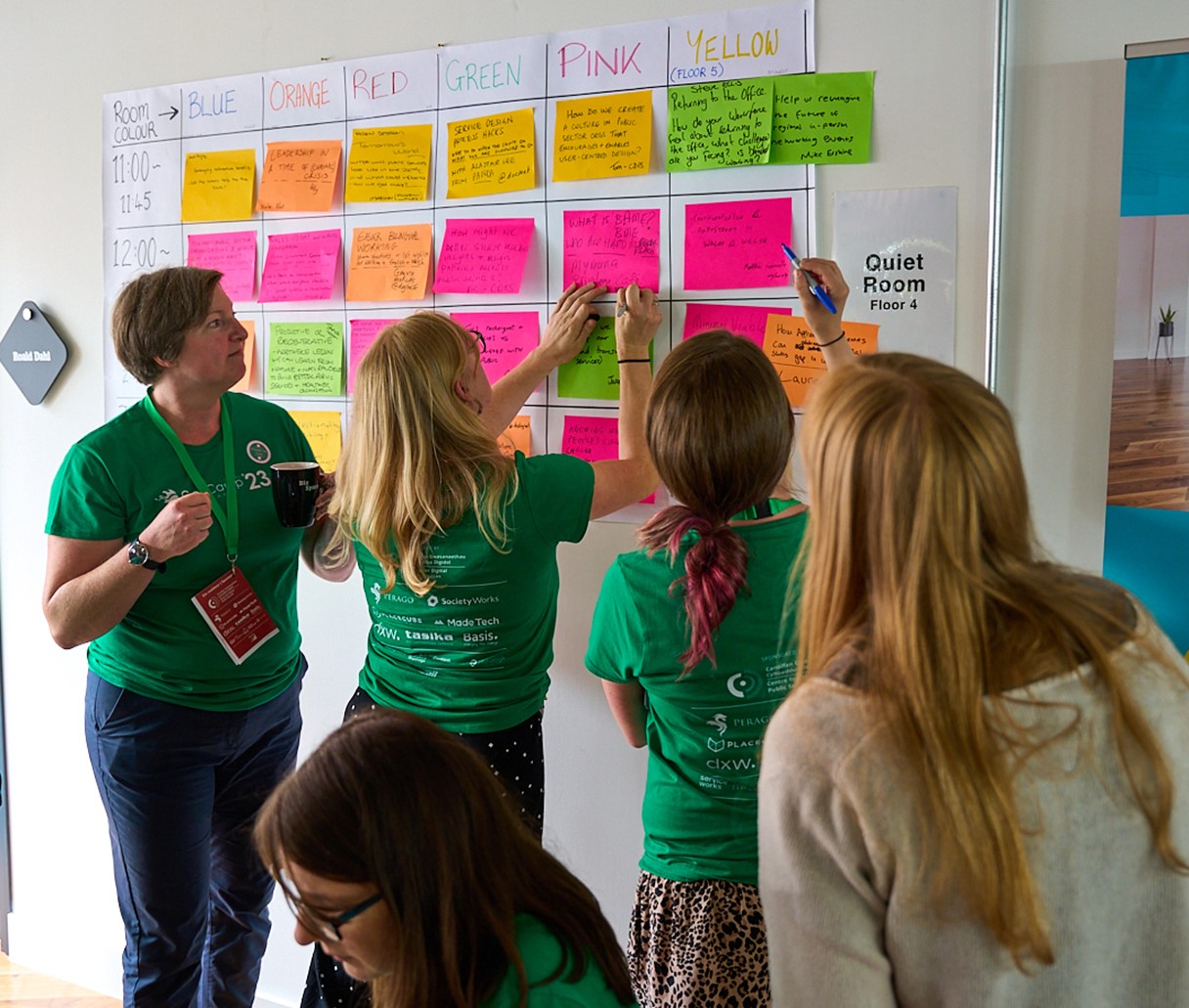
These are just some of the topics proposed at the start of the day:
- leadership in a time of (chronic) crisis
- easier bilingual working
- how can we be truly agile within a high governance environment?
- how might we better share research insights & design patterns across public services?
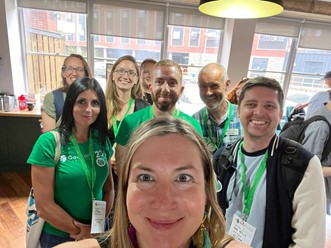
Heledd also proposed two topics:
- how many public sector organisations & websites does a person have to interact with to complete a task?
- we have no shortage of meetings, a myriad of ways to connect - why is collaboration & communication still a challenge?
These topics offered us all a great opportunity to chat about new ideas with others across the public sector.
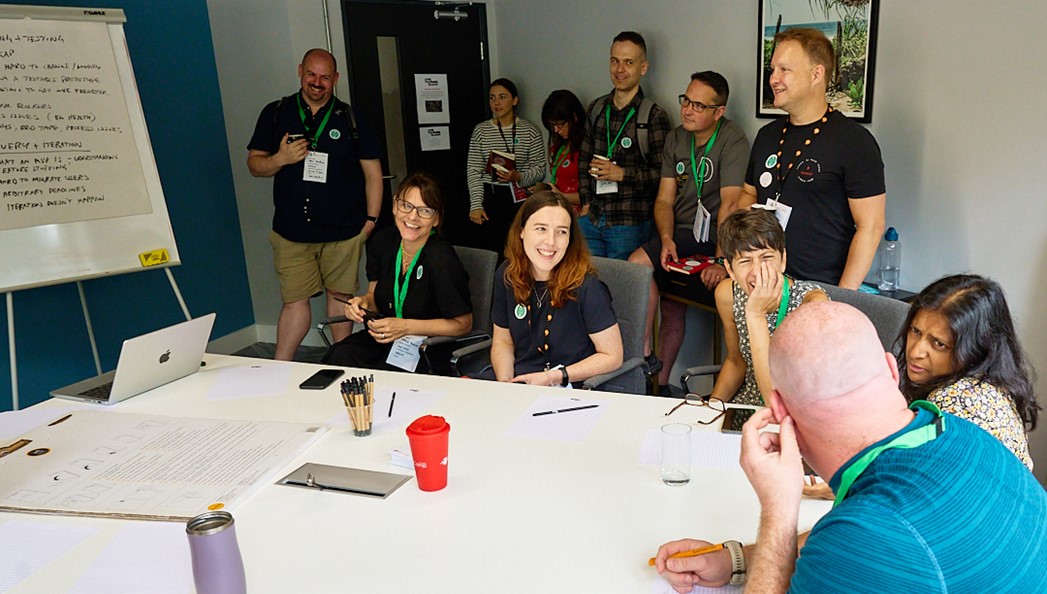
Once you have decided on a topic you would like to join, you head to that room. Everyone is encouraged to “move to where you can make a difference”, even if a session hasn’t finished.
Faces will change and room dynamics will shift, but with this comes new energy and insights to sessions.
Value of networking
There was huge value in being together at Gov Camp and networking with others from the public sector. We all want to see services improved.
Since Gov Camp Cymru 2023, there are plans for groups of people across the public sector in Wales to get together on a regular basis. The primary aim is to consider how we can improve things for the user.
Sophie from the digital team also attended the event and had this to say:
Despite my nerves going into the day, I thoroughly enjoyed my first GovCamp experience last week. My first session of the day, ‘service design hacks’ was a great space for people from a variety of public services to share their insights and best practice. To improve the design process, it’s crucial to establish outcomes early in the process to ensure we find the right solution. I was also reminded of the importance of conducting user research with users who tend to be excluded from the service, allowing for a better model to be developed in the prototype phase of delivery.
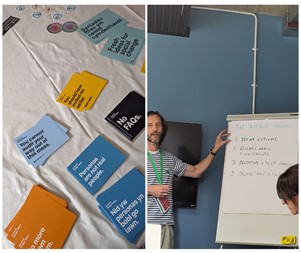
After a busy morning of networking and brainstorming with some really inspiring individuals, we stopped for a very tasty curry for lunch. As a newcomer, I was feeling a little overwhelmed by all the networking at first, but I needn’t have worried as the atmosphere was so friendly and it facilitated many an interesting discussion between new and old faces.
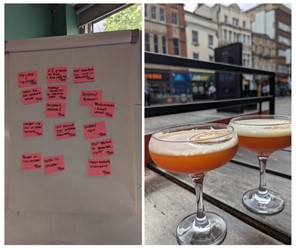
My favourite session was about improving the education system so that it works for a greater number of individuals, including students who are neurodiverse or who may have varied educational needs. Many of us had personal ties to the topic and agreed there were practical methods of adapting content to suit different students’ learning styles and individual needs, however due to curriculum constrictions and differing educational views on a legislative level, sadly this does not feel like a priority.
At the end of the day, we continued the party over at Pie Minister with delicious pies and cocktails! All in all, my first GovCamp experience was one of my favourite days since joining NRW and I am already looking forward to next year!
Website upgrade
Sometimes people don’t understand the effort others go to in their jobs. Every week we ask others in the team “anything to add to the week notes?”. This week Owain sent Phil some stats and a brief description of what he has been doing. The volume of this work is massive and so I didn’t just want to add those stats and the work to the “other things we’ve been working on”. I think this rightly deserves its own special mention.
Owain has completed the update of thousands of related links, custom sidebars and search related results, you did read that correctly…..thousands!!! This was mentioned last week but Owain has now finished this massive task.
It doesn’t end there though, as if a thousand related links, custom sidebars and search related results aren’t enough for Owain, he has started to migrate the latest content changes across, working from one spreadsheet to another. There are over 160 of these changes, some of them not small changes, with even more to come before the website upgrade is finished.
Then…..Owain will make a start on the content accessibility bugs as well.
Not all heroes wear capes……but Owain does! Thank you for all your hard work.
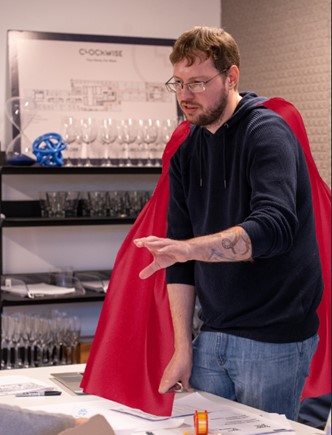
….and now an update from our forms expert
Andrew has completed the online form ‘Application for Water Industry Act consent (section 166)’ for water companies in Wales to seek consent from our permitting team when discharging waste water. This work forms part of SRoC. Thank you to our expert Maria and Shaun, our content designer, for their work getting it over the line in such an incredibly short time-frame.
Andrew has also completed two medium combustion plant forms to tie into our SRoC work. Again, big thanks to our expert Claire for her advice in getting the forms into a final state and Shaun for casting his expert eye over the content design side of things. The new forms are:
- Permit for a stand-alone medium combustion plant between 1 and less than 20 MW
- Permit for a stand-alone medium combustion plant that are also Specified Generators or Part B activities (MCP/SG/Part B)
Then Andrew worked with Martin, our fisheries expert to ensure we’re ready for the start of the new fishing season on the 1 July. This work included producing a new form to accept weekly catch returns, restricting certain catch days and landing locations (as opposed to the daily returns on the old form with more catch days and landing locations).
And finally, Andrew has even updated our web advice outlining these changes to the public and commercial cockle collectors.
What can festivals teach us about user centred design?
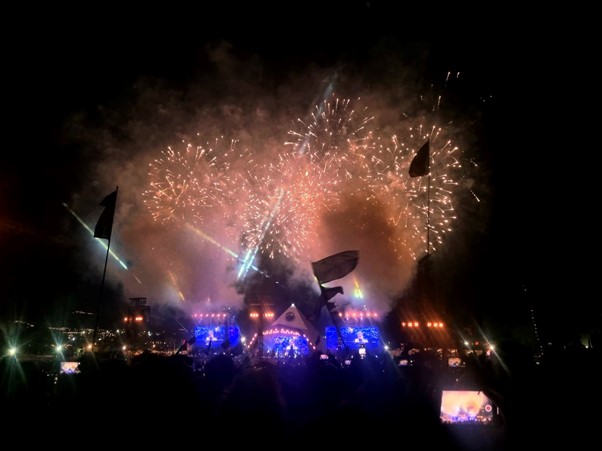
While most of the team attended digital Glastonbury, Lucinda attended GLASTONBURY. When she entered back into the world of work on Wednesday, she was not entirely sure who she was or what she was doing here, but quickly fell back into the swing of things.
Below, she shares some insights about what festivals have to teach us about digital design.
“I’ve attended 3 festivals this summer, 2 as a volunteer. Volunteering is great because I can usually get a free ticket, but it’s also a really interesting look into the inner workings of a large event, and when you pair that with some learnings from the service design in practice course, you start noticing where where services work (and where they need to do better).
A nameless festival I attended this year advertised a good festival experience for customers with accessibility needs. Four campsites had been dedicated for these customers to stay in, with the promise of being driven straight in by car or by shuttle buggy. If there is no room, there would be space in the quiet campsite.
Where this went wrong was that this site was clearly designed on a map with no indication of where there were any inclines or declines in terrain.
This meant that on the day of arrival, most people found out that one of the bigger campsites was already full as only about 60% of the campsite was flat, the rest was a steep drop. Not suitable for anyone to camp in, never mind if you had additional access needs.
This resulted in a terrible experience for disabled customers and people with accessibility needs. Some people had to wait over 3 hours outside of the festival (without access to a water point or accessible toilets) for a shuttle buggy to take them to an already full campsite.
Another smaller problem was the lack of clear signage. I can’t tell you how long it took me to find a taxi rank on the festival map only to discover it was only a few metres away under a large sign that said ‘PUDO’.
Pick
Up
Drop
Off
Just another great example of acronyms ruining a message.
In summary, as I stood in a volunteer’s vest in the baking heat dealing with the many problems caused by poor design, I realised how important communication across teams was in ensuring people’s needs were properly accommodated for at every stage of a person’s (or user’s) journey through a festival site or website. The importance of clear signage that doesn’t rely on acronyms or jargon to communicate a message is also paramount when creating content for the general public.”
Other things we’ve been working on:
-
James has been working with the flood risk team to roll out a new platform for our flood maps. He’s also working on a design for our SoNaRR 2025 web pages.
-
Heledd and Laura became experts on pink salmon this week, you can find out more about how they did this on the identify and report Pacific pink salmon webpage.
-
Heledd joined a quarterly meeting with the CDPS Advisory Panel. Members of the panel were given an opportunity to give feedback and share advice on the first apprenticeship scheme for user centred design in Wales (and possibly the UK!). It’s open to anyone over 18 years old - whether they are leaving education or if they are at a different stage of their life and looking to change careers. It’s possible that NRW could have an opportunity to partner with CDPS on future apprenticeship schemes.
-
Sophie has been experimenting with ChatGPT, having been inspired after reading an interesting article by Content Design London and exploring AI solutions to help us simplify things over at the Digital Team HQ.